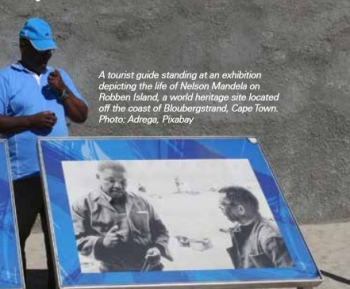"Sho't Left" - Youth going nowhere slowly
Tourism is a service industry, and workers in the industry are required to possess a range of skills to deal with situations as they arise. These include technical skills in the use of digital communication and soft skills such as communication, teamwork, leadership, conflict resolution, time management, planning, and the ability to work under pressure. A review conducted by the HSRC found that basic and higher education does not respond adequately to the skills requirements of the tourism industry.
Enhancing labour-market outcomes for youth in the tourism industry

A tourist guide standing at an exhibition depicting the life of Nelson Mandela on Robben Island, a world heritage site located off the coast of Bloubergstrand, Cape Town. Photo: Adrega, Pixabay
Underinvestment in basic education and schooling has resulted in the majority of learners and workers in the tourism industry not being equipped with basic numeracy and literacy skills. An absence of career guidance also prevents meaningful transition from school to work. These factors affect the employability of the youth in the tourism industry due to perceived skills deficits by the industry. It also affects the quality of employment that the youth are able to obtain.
The research approach
The HSRC-led review process was implemented over a period of 18 months and included a multidimensional approach. It was participatory, with widespread stakeholder consultation and included a skills audit and a review of the 2008 Tourism Human Resource Development Strategy. The aim was to understand the human resource development skills needs and the gaps and barriers to upskilling in the industry. The key findings revealed challenges with adult literacy, poor quality career guidance, a lack of soft skills and low graduation levels, with students being insufficiently equipped for the workplace.
Adult literacy
Low levels of formal education were found with 15 189 (7%) of employees who had less than grade 9 education and 45 800 workers who had completed grade 10 or less (below NQF level 2). This may also account for the lack of progression of most employees in the sector, some of whom were found to have stayed for 10 years in one position. Furthermore, CATHSSETA records revealed that during the same period, only 336 learners received adult literacy and numeracy training, representing only 2.4% of those who needed it.
Career guidance
The quality of career guidance available to school learners and higher education students is generally low. The study found that the factors motivating the choice of tourism courses in secondary education and in institutions of higher learning were often based on the perception that tourism courses were easy to pass and that entry requirements were low. Over the previous five years, enrolment in basic tourism and hospitality courses increased exponentially, with approximately one in five (20%) of all matriculants taking one or more of these courses. There is evidence that this was motivated by the need to pass matric as most of the growth was found in provinces with the lowest matric pass rates. As such, tourism served as a dumping ground for academically weak students.
Soft skills
According to the HSRC-led review, an estimated 38 427 (23%) of all employees in the tourism industry lack computer training, including elementary computer literacy, technical computer literacy (usually requiring competence in using specific software such as Amadeus) and advanced computer literacy. Soft- skills deficits included leadership, networking, problem solving, critical thinking and communication skills.
SMME and graduate self- employment
A defining feature of South Africa’s tourism industry is that 90% of the role players in the sector are small businesses. Global research on small, medium and micro enterprises (SMMEs) suggests that entrepreneurship education contributes directly to the increased formation of new ventures, and the likelihood of self-employment, development of new products, and self-employed graduates owning high- technology businesses. It also shows that the more experienced SMMEs in this sector have enhanced survival capabilities.
A development needs assessment of over 100 SMMEs undertaken by the Tourism Enterprise Partnership revealed that the top five most needed skills across all SMMEs were customer service skills (77%), leadership skills (74%), communication skills (74%), generic management skills (72%) and financial management skills (72%).
Poor throughput (graduation) rates
The graduation rates at technical and vocational education and training institutions are low, with only 41% of learners reporting that they were able to access compulsory work- integrated learning placements with industry service providers. At least 20% of graduates had never secured employment since graduation. Industry stakeholders reported that graduates’ training did not equip them with the skills to meet industry requirements.
Implications for implementation
Based on its study, the HSRC recommends that government should actively promote adult basic education and training among tourism industry workers, to reduce the number of those below NQF level 1 over the next 10 years. Investment in tourism career guidance at secondary and tertiary level is also essential. Educators, training providers, curriculum developers, accreditation institutions, and employers need to integrate soft skills and general business skills into their training and workplace mentorship programmes.
Furthermore, these programmes should address the needs of entrepreneurs to ensure the sustainability of enterprises operating in the tourism industry. There is also a need to improve support and access to work-integrated learning opportunities for tourism learners, to increase the possibility of job placement.
Authors: Shirin Motala and Stewart Ngandu, senior research managers in the HSRC’s Economic Performance and Development research programme
smotala@hsrc.ac.za sngandu@hsrc.ac.za
This article draws on work undertaken by a team of researchers, including Shirin Motala, Stewart Ngandu and Dr Irma Booyens.
